Institutional Context
Summary
Through local, national and international collaborations and partnerships, the University of Cambridge aims to shape and advance many fields of research. We support diverse and forward looking research communities to become global leaders in interdisciplinary discovery and innovation. This has wide policy, social, cultural and economic impact, which, in 2020-21, totalled a £29.8 billion impact on the UK economy.
Although the fourth-oldest university in the world, we are a vibrant, contemporary organisation with a mission to contribute to society through education, learning and research at the highest international levels of excellence. Through our 31 autonomous Colleges and 150 Departments, Faculties and Institutions, we are committed to providing a creative and supportive environment in which research and its application can flourish.
Institutional context
Knowledge Exchange (KE) enables the University’s world-leading research and teaching to translate into meaningful, positive, societal change at scale. It does so through many varied mechanisms which engender excellent entrepreneurship, technology transfer and commercialisation, long-term business engagement and partnerships, policy engagement and social and cultural impact.
Cambridge hosts Europe’s largest technology cluster, and the University stands at its heart. Our research, skills and innovations support more than 5,300 knowledge-intensive companies who generate more than £18 billion turnover and provide almost 70,000 jobs. We are home to 23 unicorns ($1 billion businesses), including ARM, Aveva, Medimmune and Illumina, all founded or symbiotically connected to research from the University.
Our technology transfer company Cambridge Enterprise (CE) is responsible for supporting the translation of University research and helps innovators use commercial avenues to develop ideas for the benefit of society. They lead over 65 programmes in entrepreneurship, innovation and commercialisation and coordinate a network of KE professionals who support early stage enterprises. CE is also home to TenU, a collaboration of leading technology transfer organisations from the US, Europe and the UK.
Key to our KE work is the development of mutually beneficial and effective collaborations with academic partners, companies, NHS trusts and hospitals, NGOs, charities and organisations in the local community. Through deep understanding of these key sectors, the University’s Strategic Partnerships Office proactively build high impact partnerships regionally, nationally and internationally. This includes multi-disciplinary research and training partnerships to promote long-term collaboration between commercial organisations and university researchers.
Across the globe, our research provides public policymakers with the insights and evidence they need to formulate effective policy. Our Centre for Science and Policy promotes relationships between policy professionals and academics by linking relevant research to the economic and political dimensions of policy-making.
Our Public Engagement with Research operates at scale to connect the University with communities around the world. This includes through the Cambridge Festival, where 350+ events attract more than 100k visitors and the University of Cambridge Museums and Botanic Garden who attracted almost 700,000 across 9 sites in 2021-22. The University also engages in collaborations with schools (such as Millennium Maths Project, Isaac Physics) connecting researchers with the community and science with society. In addition, through executive education and professional development programmes, provided by institutions such as Cambridge Judge Business School, Cambridge Institute for Sustainability Leadership and the Institute for Manufacturing, the University supports the development of knowledge and skills in organisations around the world.
Our Strategic Research Initiatives & Networks and Interdisciplinary Research Centres tackle challenges that only multi-disciplinary teams can address. For example, Cambridge Zero, our flagship initiative on climate change, is working to bring inter-disciplinary thinking and cutting-edge technologies to the global climate emergency response and AI@Cam, our artificial intelligence mission, is creating connections between disciplines, sectors and communities to unlock a new wave of progress in AI.
The University is committed to fostering a thriving KE culture, supporting entrepreneurial innovation and experimenting with new ways of delivering activity to our diverse partners and collaborators.
For further information, please send queries to Louise.atkins@admin.cam.ac.uk
Local Growth and Regeneration
Summary of approach
The University of Cambridge is a global institution with historic roots running deep across its city-region. It sits at the heart of an ecosystem which both attracts and produces exceptional companies, generating economic growth and creating a wide variety of employment. Our work with regional partners seeks to ensure that this growth is sustainable and that the opportunities it creates are accessible.
This narrative focuses on areas of identified regional need where the University contributes significant strengths both through its academic driven research activities and as a placemaker, shaping and delivering improvements to public life and commercial opportunities.
Aspect 1: Strategy
We work collaboratively with local and regional partners (private and public) as a major driver of local economic growth and job creation - and in a way that is more sustainable, more inclusive and more accessible in terms of public infrastructure.

Figure 1. Strategic approach to local growth and regeneration.
Our ambition to support the delivery of sustainable and inclusive growth for all in our region is based on activity across four key areas of identified local need; (1) Health (2) Education (3) Place (4) Connectivity. Underpinning our activity across these areas is our academic-driven research with local communities, nearby commercial partners and public bodies. In this way we can embed our world class research excellence within our approach to regional outreach.
At the regional level we identify three distinct spatial geographies as of particular importance to our work (see Figure 2. and Table 1.) These geographies reflect both regional functional economic ecosystems and the political administrative boundaries of local authority partner institutions.

Figure 2. Local growth and regeneration geographies.
| Geographies | Key Stakeholders |
|---|---|
| Greater Cambridge City Region | Residents Local business Staff and students Cambridge City Council South Cambridgeshire District Council Greater Cambridge Partnership (GCP) |
| Cambridgeshire and Peterborough | Cambridgeshire and Peterborough Combined Authority (CPCA) Business Board 7 local authorities Cambridgeshire and Peterborough NHS Foundation Trust |
| East of England | The Ox-Cam Arc Universities Group England’s Economic Heartland Agri-Tech East The London Stansted Cambridge Corridor The Cambridge Norwich Tech Corridor |
Table 1. Key stakeholders at local growth geographies.
As well as delivering on our role as a ‘local/regional’ organisation, our research and knowledge exchange activity has global impact and attraction; we therefore also understand our role to be the driving heart of one of the most significant innovation ecosystems in the world.
Understanding need through engagement with partners
Our identification of key areas of local need comes through deep analysis of locally available evidence and engagement with partners to understand their pressures and priorities.
Senior academics and staff bring the University’s knowledge base to many committees and advisory boards related to growth and regeneration, including:
CPCA Business Board
The Greater Cambridge Partnership
The Oxford-Cambridge Arc Universities Group
Cambridge Ahead
The University was a key contributor to the Cambridgeshire and Peterborough Independent Economic Review. This remains the essential, underpinning evidence base on the economic performance and potential of Cambridgeshire and Peterborough.
Subsequently, the Cambridgeshire and Peterborough Independent Commission on Climate, has developed an evidence base and collective understanding for the area on the options available to decarbonise the economy and build resilience to the impacts of climate change. Several University experts sat on the Commission, including the Director of the Institute for Sustainability Leadership, Director of Cambridge Zero, and the holder of the chaired Professorship of Climate Change Policy.
We also contributed to a recent report from the East of England All Party Parliamentary Group which evaluated the region’s progress towards achieving the Government’s 12 levelling up missions. This identified transport, education, skills, health and housing as areas where the region has “low confidence” that it will meet government targets and identified priorities to address these deficits.
Our region’s population is growing rapidly. 2021 census data shows that the official population of Cambridge has increased by around 17.6% since 2011. In South Cambridgeshire the increase has been 8.9%. This is driven by job creation; over the last six years the average annual growth in employment has been 5.3% in the city region.
However, the benefits of economic growth are neither as inclusive nor as widespread as they should be. Figure 3. taken from the Cambridgeshire Insight analysis, demonstrates that there are pockets of severe deprivation in the Greater Cambridge area and stark inequality between neighbouring wards. Across the wider Cambridgeshire and Peterborough geography Peterborough and Fenland are the most deprived areas.
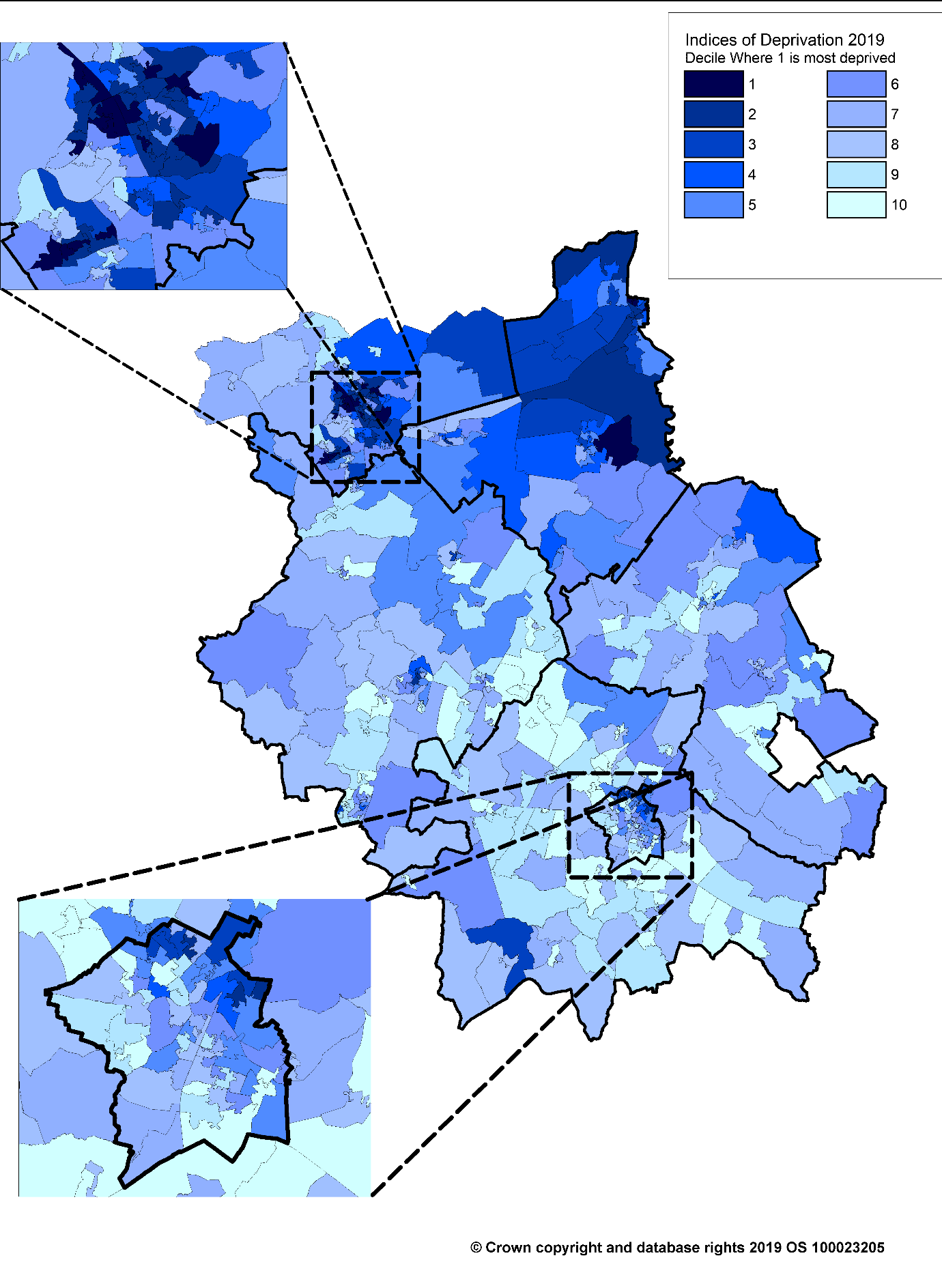
Figure 3. Cambridgeshire Insight Analysis – Index of Multiple Deprivation data (2019).
Such stark inequalities manifest themselves in health and educational outcomes. As outlined in the Cambridgeshire and Peterborough CCG Health Inequalities Strategy, a “10 year life expectancy gap exists between men living in the poorest areas of Peterborough compared to the richest areas of Cambridge". Whilst Greater Cambridge is experiencing strong employment growth, the challenge for our region is to ensure that young people are educated and upskilled to access opportunities. The CPCA Employment and Skills Strategy identifies that only 31.5% of school leavers in Cambridgeshire and Peterborough progress to continuing education or training, compared with 35.2% nationally.
Economic growth also puts pressures on housing and infrastructure in our city. Unless properly planned there is a risk that growth has a detrimental impact on quality of life for local residents and on our local environment. Centre for Cities reporting shows that house prices in Cambridge are amongst the very highest in the country (on average 13.4x average wages). High levels of congestion and inadequate public transport options limit access to opportunity, while leading to more emissions, pollution and car-dominated public spaces.
Aspect 2: Activity
The University of Cambridge underpins the success of the Cambridge Cluster, where over 5,300 knowledge intensive firms represent approximately 30% of the workforce. We provide the support and investment which academics and researchers need to achieve knowledge transfer – creating a deep and rich recruitment pool of unique talent from across the University and fostering a culture that encourages innovation and entrepreneurship. We have established both a technology transfer company, Cambridge Enterprise, and an investor, Cambridge Innovation Capital, which make available capital at all stages of the investment journey.
We also invest in the places that enable innovation to flourish. At our 66 hectare West Cambridge site, the University is constructing an Innovation District of global significance - focused on technology and the physical sciences. This complements our development of the Cambridge Biomedical Campus (CBC), now the largest biomedical research site in Europe. In recent years we have undertaken significant capital investment dedicated to collaboration with partners, such as the Heart and Lung Research Institute and the Ray Dolby Centre.
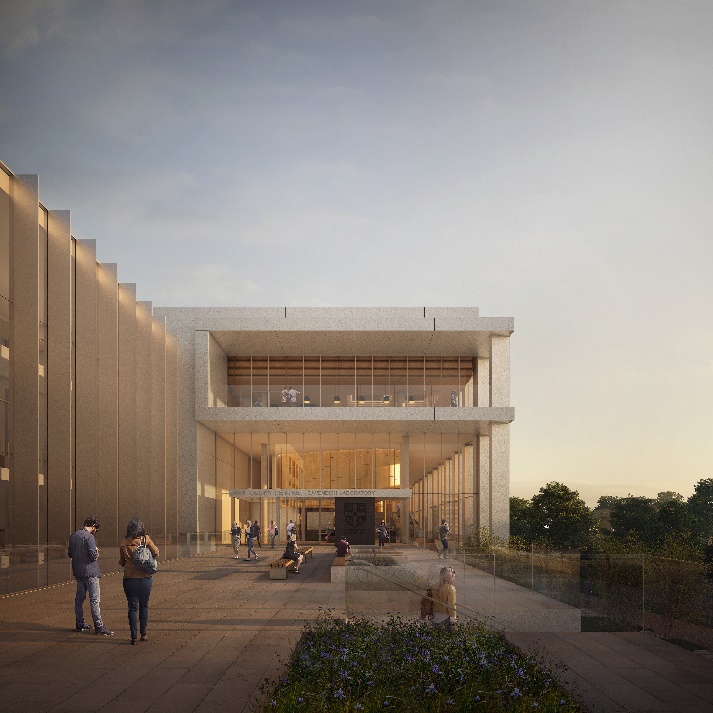
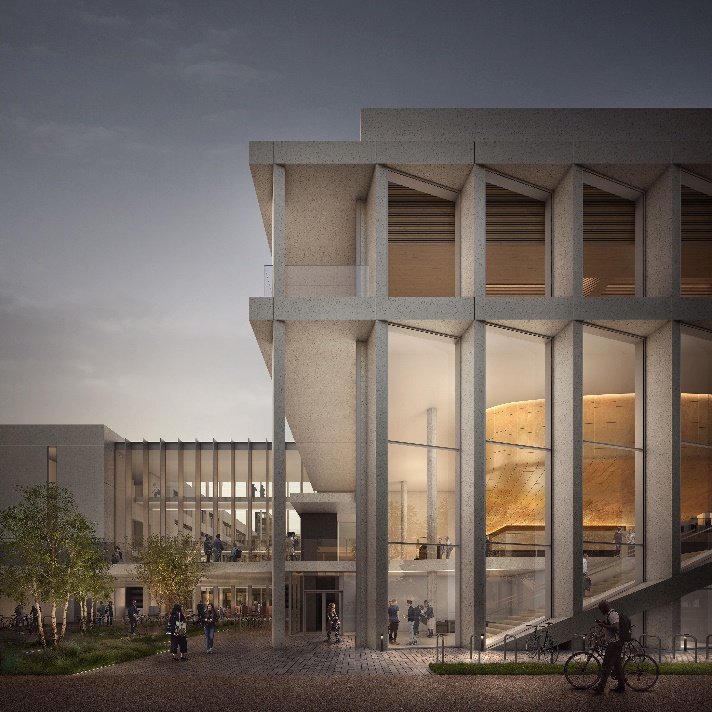
Figure 4. Ray Dolby Centre (Cavendish III) - a major new project to replace the existing facilities for the Department of Physics at West Cambridge.
Our response to Aspect 1 identified four key areas of local need where the University contributes to ensure that knowledge intensive growth is sustainable, inclusive and accessible. Below describes some examples of delivery for each area.
Health
The CBC is home to Cambridge’s School of Clinical Medicine, world-class institutes and two hospitals – Cambridge University Hospitals (CUH) and Royal Papworth Hospital – with two major new hospital buildings planned for the Cambridge Cancer Research Hospital and Cambridge Children’s Hospital.
CUH NHS Foundation Trust ensures that research at the CBC integrates NHS patients. At any given time, the Trust hosts over 1,000 R&D projects, maximising patient proximity to the latest biomedical breakthroughs. Examples include the development of an artificial pancreas to protect very young children with type 1 diabetes and rapid whole genome sequencing to aid diagnosis in severely ill children. The Ovarian Cancer Research Programme at the Cancer Research UK Cambridge centre works with a patient group to provide invaluable input into research and clinical trials to improve outcomes in treatment.
Cambridge University Health Partners is a strategic partnership between the NHS, the University of Cambridge and Anglia Ruskin University, aimed at improving patient care and patient outcomes through innovation and integration of service delivery, health research and clinical education.
Our scientists were also at the cutting edge of the research response to the Covid-19 pandemic, including our partnership with AstraZeneca and GSK to create a new diagnostics laboratory on our Biomedical Campus; our leading role in the Cambridge led COG-UK genomic surveillance consortium; and our Institute of Therapeutic Immunology and Infectious Disease.
Education
The University’s principal asset is its people and so we have integrated many of our PhD & postdoctoral students into outreach programmes across the region, to help combat regional inequality and increase student aspiration in struggling schools.
Our Insight Explore programme in Peterborough and West Norfolk, for example, connects University postdocs with pupils across 14 state schools, unlocking academic opportunity for local communities. Participants come to Cambridge several times each year to attend events designed to help students to develop skills and increase their understanding of university life.
We also work closely with local partners to address social mobility, including through the Network for East Anglian Collaborative Outreach (NEACO) which delivers targeted outreach activities across East Anglia. Additionally, each Cambridge College is linked to a particular region of the UK under the College Area Links Scheme. Through this programme Schools Liaison Officers create an established point of contact for schools and colleges in each part of the UK. Schools in Cambridgeshire are thereby connected to several colleges.
During the Covid-19 pandemic the University provided bursaries for 1,000 adults who were hit hardest by the coronavirus to continue their education. Aimed at key workers and those who had been furloughed or made redundant, the scheme opened up access to part-time courses in 30 different undergraduate qualifications. Over 70% of the Thousand Futures bursaries were awarded to recipients residing in the East of England, and nearly 40% to those residing in Cambridgeshire.
Place
The Centre for Business Research at the University, working with Cambridge Ahead, produces detailed data to track employment and business growth across Cambridgeshire and Peterborough. Findings are regularly updated on the Cambridge Cluster Map. This work now constitutes over a decade of rich data showing what is happening on the ground in our local economy, and is freely open to the local community. In parallel academics in our Department for Architecture have developed a model to forecast fluctuations in local transport, housing, employment and land value – enabling local planners to make choices informed by cutting-edge research.
The University has also taken direct action to address Cambridge’s housing shortage. At Eddington we are building a new sustainable community, with provision for 3,000 homes (half subsidised for key workers). The community enjoys social facilities in the neighbourhood, including the Storey’s Field Centre, the OFSTED outstanding-rated University of Cambridge Primary School, a nursery, retail, parklands and sports pitches.
We are also leading by example in demonstrating sustainability in the operation, maintenance and construction of our buildings, towns and cities. The Cambridge Institute for Sustainability Leadership works with the built environment industry to achieve transformative change in the one of the most environmentally burdensome sectors. This is exemplified by the prize winning Entopia Building, a repurposed ultra-sustainable office building in the heart of Cambridge.
Elsewhere the University is partnering with Cambridge City Council to explore the feasibility of developing a Cambridge City Centre Heat network, which could reduce emissions produced by historic buildings, including various University and College sites.
Across the wider Eastern Region our researchers are collaborating with farmers in the Fens to tackle environmental threats through landscape regeneration and with communities on the Suffolk Coast to manage coastal erosion.
Connectivity
The University is a statutory partner on the GCP, providing advice and research expertise. Current programmes include four new busways for better transport connections from growing communities around the city and a network of 12 “greenways”; safe and easy routes for more active travel journeys in the region. We are also working actively with local authority partners to develop new transport technologies across the city, including trials of autonomous vehicles around the University’s West Cambridge site. With Cambridgeshire County Council, we created a “digital twin” for the city of Cambridge, using urban modelling techniques and advanced data analytics, to help address congestion and pollution.
We recognise the importance of strong transport connectivity between key employment and research hubs across our city. The University works with local bus operator Whippet to provide a subsidised bus service, for everyone to use, linking Eddington with West Cambridge, the city centre, the railway station and the Cambridge Biomedical Campus. The bus fleet will be fully electric later this year.
Digital connectivity is also vital to economic strength and thriving communities. The University has therefore united its technological expertise with Cambridgeshire County Council’s ambition to deliver better digital connectivity in the city and beyond. Together we have formed Light Blue Fibre, making both organisations’ extensive duct and fibre networks available for commercial use.
Aspect 3: Results
A recent report by London Economics provides an external evaluation of the University’s institutional economic impact. Our net total economic impact on the UK economy is nearly £30 billion annually and we support more than 86,000 jobs in the Cambridge region and across the United Kingdom (including 52,500 jobs in the East of England).
The University’s activities have shown success in getting research to market, helping to create significant economic growth around Cambridge and across the UK, changing people’s lives for the better. Some of the depth and breadth of this influence is illustrated on the University’s UK impact map and global impact map, highlighting examples of economic, health, social, environmental and other research impact. Our role at the heart of the Cambridge ecosystem is also communicated through our annual innovation in numbers report.
Cambridge Enterprise is responsible for supporting University research to create economic and social impact. Figure 5. provides examples of local companies which have emerged from our research. Over the last three years (21-22, 20-21 and 19-20):
The University has invested £11.915 million in 58 different companies.
The same set of companies have leveraged an additional £292M of investment into the local area.
We have supported (in a broader sense through technology creation and licensing) the creation of 12 additional companies which have raised a total of £6.4M.
Examples of local companies which have emerged from our research include Nyobolt, which is bringing fast charging solutions to applications ranging from electric vehicles to industrial robotics, and Paragraf, the first company in the world to mass produce graphene-based electronic devices using standard semiconductor processes.
Across our local growth and regeneration activity we measure and monitor impact to ensure we are meeting our objective of supporting sustainable and inclusive growth for our city and our wider region:
Our world class health research both improves patients’ lives and makes the NHS more sustainable:
CUH currently have 750+ active research studies taking place.
Between 2019 and 2020 CUH had over 16,000 research participants.
CUH supported more than 30 Covid-19 related research studies, including RECOVERY, and the Cambridge-led TACTIC trial.
Our education outreach and interventions are helping to address social mobility:
In the past academic year NEACO engaged over 13,000 young people in years 9-13 living in target Uni Connect wards across East Anglia.
We worked in 89 schools to provide both targeted and strategic outreach activities.
We collaborated with over 40 regional organisations supporting underrepresented groups.
More than half of East of England recipients of University bursaries (2019-2021) had parents with no higher education qualifications and just under a quarter of recipients had no qualifications above level 6.
We are improving our place, through data, modelling and direct provision:
Cambridge has been the number one city for housing growth over the last 10 years of available data (between 2011 and 2021) with a 16.16% increase in housing stock.
370,000 square feet of office and lab space is expected to be completed in 2023 – the largest laboratory development is at 1000 Discovery Drive, CBC.
University expertise and provision is improving connectivity across our innovation ecosystem:
The University supported Universal bus service bus carries around 60,000 passengers per month.
Over 60% of University staff use sustainable modes for their journey to work
Autonomous vehicle trials will be expanded with up to 13 self-driving shuttle buses operating at West Cambridge and CBC (government has awarded £8.7 million to the project matched by industry to a total £17.4 million)
Our role as key stakeholders in the region, contributing to local growth and regeneration is also recognised by local leaders, as shown in Figure 5.
Public & Community Engagement
Summary of approach
The mission of the University of Cambridge is to contribute to society through the pursuit of education, learning and research at the highest international levels of excellence. Public engagement fulfils the University’s mission by creating bridges between the academic community and the public, locally, regionally, nationally and internationally.
We believe the most impactful research happens when we build equitable partnerships with communities and stakeholders. To ensure these partnerships are built on trust and respect, we provide training, support, advice and platforms to give researchers and professional staff the skills, confidence and competence to engage well. We recognise and celebrate the most impactful engagement through awards and career advancement.
Aspect 1: Strategy
Our vision and strategy for public engagement
The mission of the University of Cambridge is to contribute to society through the pursuit of education, learning and research at the highest international levels of excellence.
Public engagement in its broadest sense fulfils our mission by creating bridges between the academic community and the public, locally, regionally, nationally and internationally. We define public engagement as the many ways in which we share expertise, knowledge gained, resources and collections to both inform and inspire those we interact with, while soliciting public input and participation in our work. The University of Cambridge as an institution values public engagement as an important aspect of academic endeavour.
We believe the most impactful research happens when we build equitable partnerships with our stakeholders and communities of interest, place or practice (publics). To ensure these partnerships are built on trust and respect, we provide training, support, advice and platforms to give researchers and professional staff the skills, confidence and competence to engage well. We recognise and celebrate the most impactful engagement through awards and career advancement. Our University public engagement strategy, and associated logic model, guides our work.
The five pillars of our public engagement with research strategy are:
Accountability: We are accountable to our academic and professional colleagues, and to our communities.
Recognition: We recognise, reward and celebrate excellence in public engagement.
Support: We support researchers and professional staff to engage effectively.
Collaboration: We develop, strengthen and maintain collaborative relationships with our communities and stakeholders.
Inspiration: We share expertise, resources and collections with our communities.
We acknowledge the diversity of engagement channels, which are as diverse as our research and our publics. We embrace and support a range of engagement typologies from dissemination to co-production and participatory methods. We believe what matters most is for researchers and their publics to find the most appropriate format to engage effectively and collaboratively.
The central public engagement team is recognised as the main source of support. Central funding supports core work. Higher Education Innovation Funding (HEIF) and external grants support strands of activity including creative projects, festival commissions and collaborative work with partners.
The Public Engagement Advisory Group provides high level guidance to embed a culture supportive of public engagement, aligned to the knowledge exchange and impact agenda. Chaired by the Pro-Vice Chancellor for Research, membership comprises senior academics and postdoctoral representatives from each School, Heads of Public Engagement, Impact and Knowledge Exchange and the University of Cambridge Museums. Members act as liaison between their School/Institution and the central University. The group meets termly, reporting annually to the University Research Policy Committee.
Public Advisory Groups exist at all levels throughout the University. For example:
Through the Cambridge Biomedical Research Centre we formally involve the public in health research though Patient Public Involvement Panels.
Community members bring local voices and perspectives to the work of our museums through the Community Panel.
Our Youth Collective, a group of 16-21 year olds, works with the Cambridge Festival to ensure young people can make decisions about events for them.
Our latest review of public engagement highlighted that culture change requires the active involvement of our academic Schools rather than a top-down approach. We support Schools and Departments to develop their own strategy, linked to the University’s. Internally, central public engagement staff are linked with particular Schools and work closely with impact and communications professionals. Externally, the team builds relationships with our community and delivers activity including our Cambridge Festival.
Too often public engagement reinforces existing power imbalances, so we pro-actively work to promote equity, diversity and inclusion, through a culture that encourages all to engage. Staff are required to undertake training and our open dialogue academies enable researchers and professional staff to challenge their own privilege and consider the ethics and equity of engagement. Our EDI statement and code of conduct sets out how our public engagement activities including the Cambridge Festival aim to be inclusive spaces.
Aspect 2: Support
Support
Whilst no one researcher’s journey is the same, we have developed a structured approach to engagement. Our public engagement journey maps out how we support researchers, from PhD to Professor with case studies to provide inspiration.
Through our Engaged Researcher training programme and bespoke advice (Figure 1.) we encourage researchers to explore why they want to engage, who they want to engage with, and the relevance of their research to these publics. This allows researchers to understand the strategic value of engagement, focusing their time and effort on activity that is beneficial to both them and their publics.
A suite of training and support moves engagement from dissemination and listening through to where communities and stakeholders are empowered to share their own expertise to inform research. In 2021/2022, we ran 41 Engaged Researcher training courses, working with >700 researchers.
We are a specialist training provider for Post Graduate Researcher Development and courses are delivered by experts from across the knowledge exchange ecosystem.
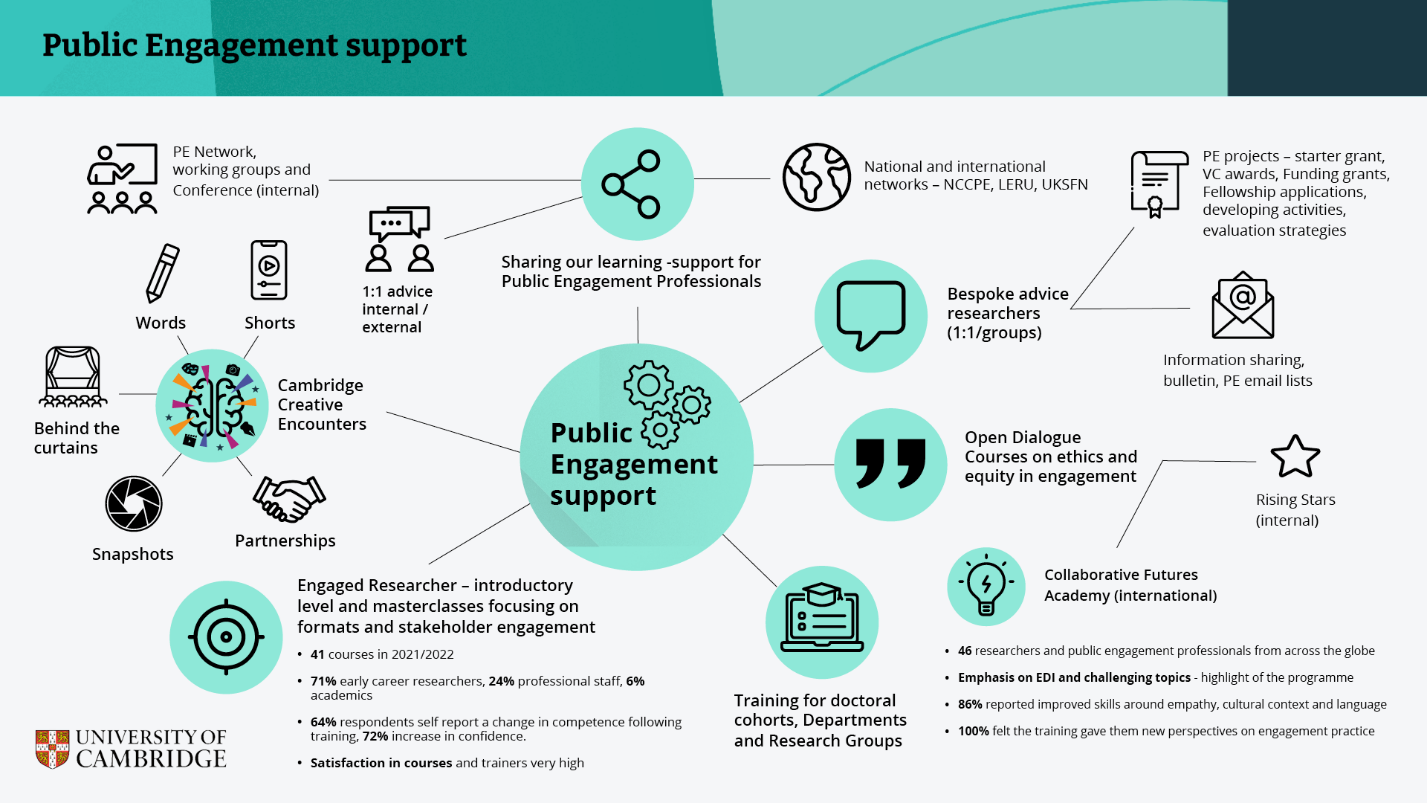
Figure 1. Public engagement support across the University of Cambridge
“The ability to complete training courses on such a wide range of topics has meant that the ones I have completed thus far have been of particular interest. By tailoring the courses to those that I feel are most relevant, I hope to be able to apply the learnings as my academic journey continues to progress.”
Public Engagement Starter grants enable researchers to work collaboratively with publics, develop a community partnership or create innovative Festival activities. Each year we fund ~15 grants of ~£1500.
Cambridge Creative Encounters links researchers with creative professionals and students to work in partnership to produce creative responses to their work. Outputs include film, animation, theatre, dance, poetry, photography and illustration.
Collaborative Futures Academy, (and our internal Rising Stars course) empowers a cohort of early career researchers to adopt fresh and challenging approaches to engagement. Developed in partnership with Berlin School of Public Engagement and Wellcome Connecting Science, this open dialogue project is an online space where participants can explore the ethics and equity of engagement, learning from each other and those whose voices are often unheard. Evaluation is through interviews, film and reflective diaries.
“I was one of the more privileged participants in the room, so I felt I learnt more from listening to other’s perspectives than others might have from sharing my own. It was eye opening and refreshing to see out of my bubble, that’s something that will not go away.”
Our Public Engagement Network for professional staff is centrally organised but community owned. Information is shared through bulletins, email list and Twitter @CamUniEngage. Nationally and across Europe we share expertise and learn from peers through active participation in National Coordinating Centre for Public Engagement (NCCPE) events and through membership of the League of European Research Universities (LERU) Public Engagement and Open Science working group.
Recognition
The Vice Chancellor’s Award for Research Impact and Engagement demonstrates how Cambridge research has a major impact on society globally. In partnership with the Research Strategy Office, awards include those for established academic, early career, professional services staff and for collaboration and partnership working with external partners.
Public engagement is valued throughout the University and recognised as a criterion in the Academic Career Pathways promotion scheme.
Aspect 3: Activity
Support, inspiration, collaboration and recognition
As a University we are committed to sharing our knowledge with stakeholders and communities. Training, advice, networking and activities bring people together to learn about, share, consult on and co-produce research.
Public and community engagement takes place in-person and online throughout the year. Some targeted at a wider general audience, other strongly focused on building significant collaborative relationships with specific publics.
The Vice-Chancellor’s Awards for Research Impact and Engagement recognise research produced through collaboration. In 2021-2022 our winners and runners-up engaged with:
Government Policy Makers, Chief Medical and Scientific Advisors, Public Health England
The media
Teachers and pupils in nine countries
Pharmaceutical Industry and Venture Capital companies
Local communities and local government organisations globally
Hospital managers, maternity unit staff, Royal Colleges, patients, patient groups and medical charities
Museum professionals
Rural communities and smallholder farmers in the UK and globally.
The new central University Impact map includes the work of our Award winners and runners up enabling us to share inspiring public engagement activity widely.
Our eight Museums and Botanic Garden welcomed almost 700,000 visitors in 2021-2022 (Figure 2.). Our museums also engage with local communities, supporting health and wellbeing through cultural connections. Their current Age Well activities respond to the elevated level of health inequalities, social isolation and loneliness experienced by older people in Cambridgeshire.
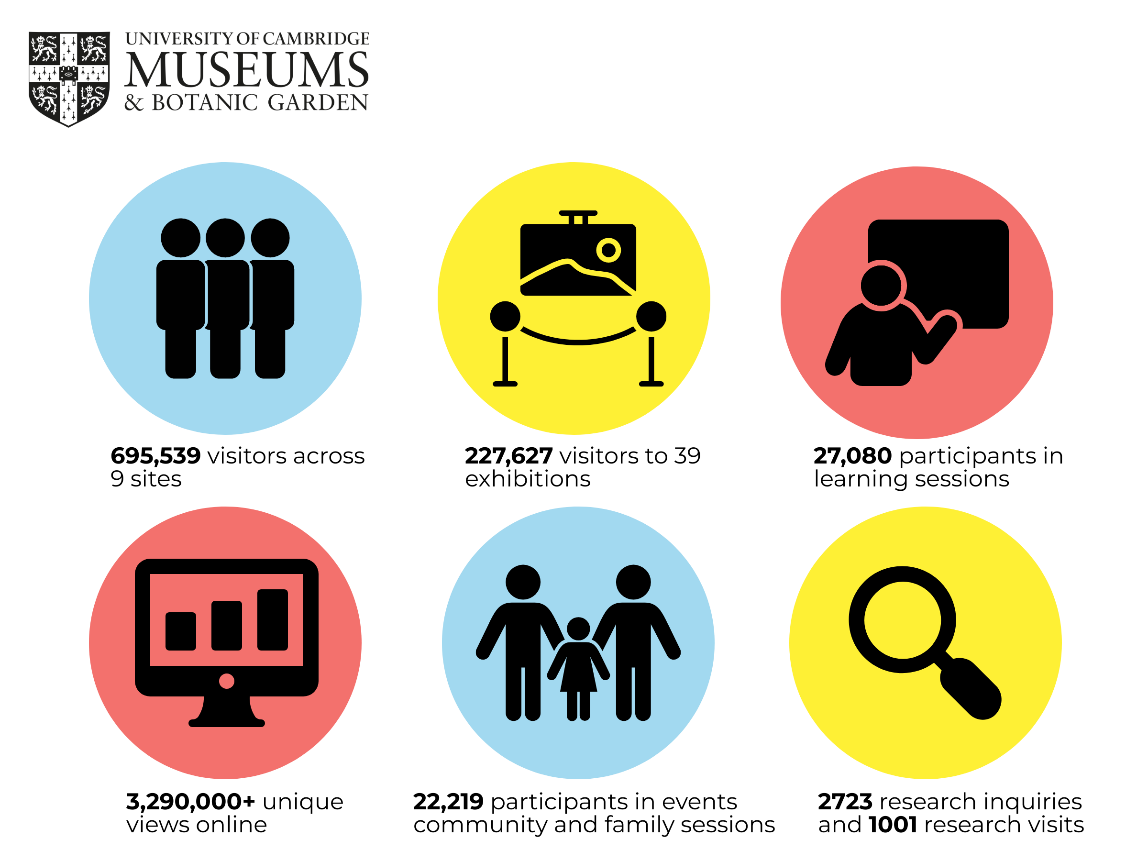
Figure 2. University of Cambridge Museums 2021-2022 in numbers.
Our Cambridge Festival (Figures 3. and 4.) provides a space where we can discuss the big questions in society today. Each year the Festival comprises ~350 events open to all with contributors from across the University and from partners including Anglia Ruskin University, charities and local organisations. The Festival is evaluated by visitors, contributors and external evaluators. 92% of Faculties regularly take part, valuing the opportunity to talk with publics about their research. The Festival is a training opportunity for our researchers and a showcase for our public engagement programmes. The Cambridge Festival and Open Cambridge, our heritage festival, include events developed and run by our community and by community artists.
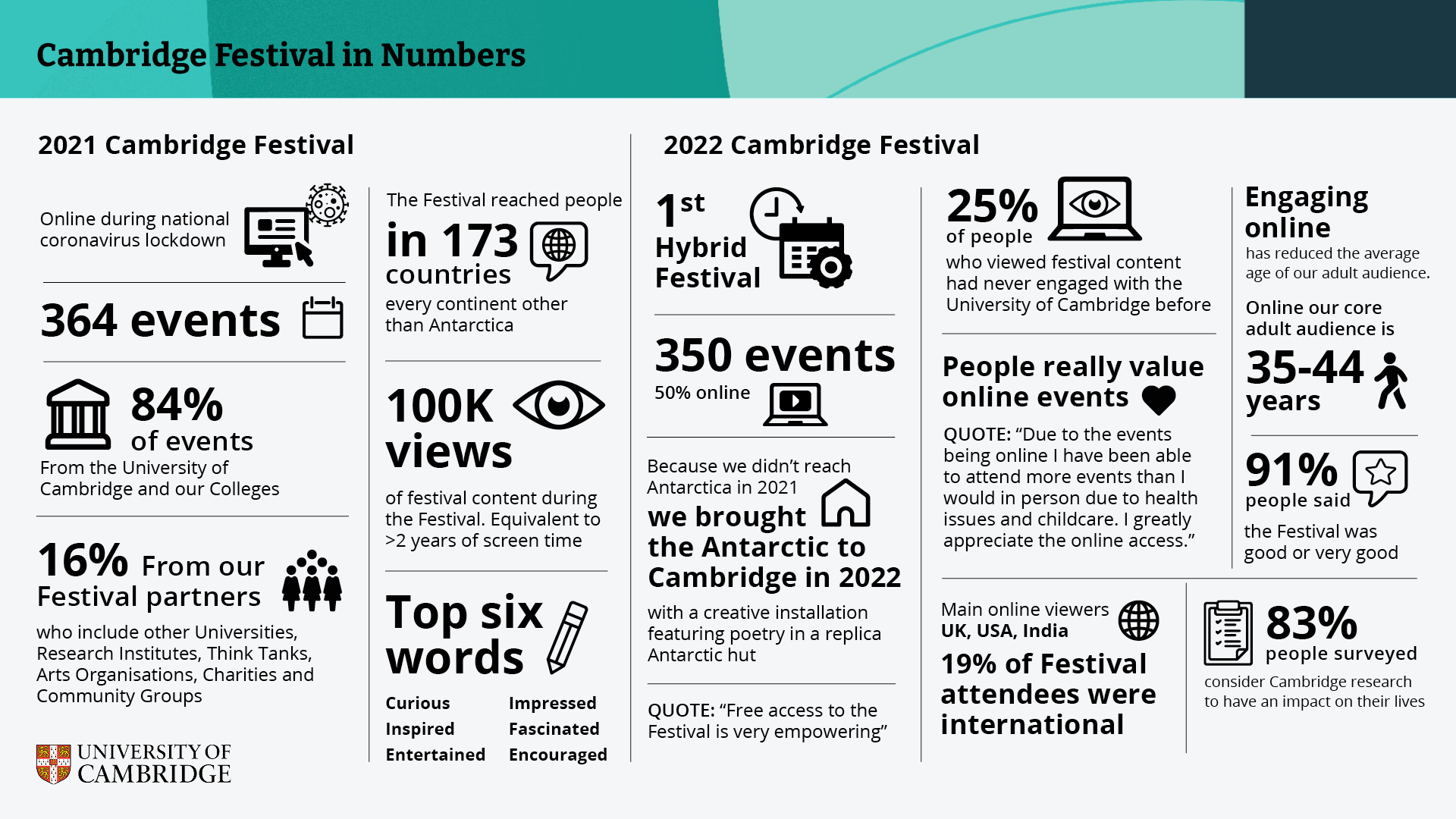
Figure 3. The Cambridge Festival 2021-2022 in numbers.
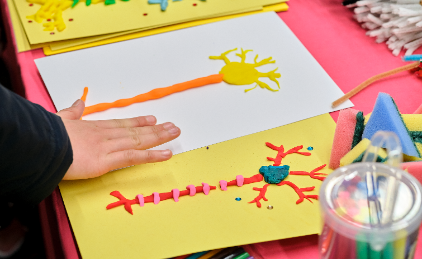
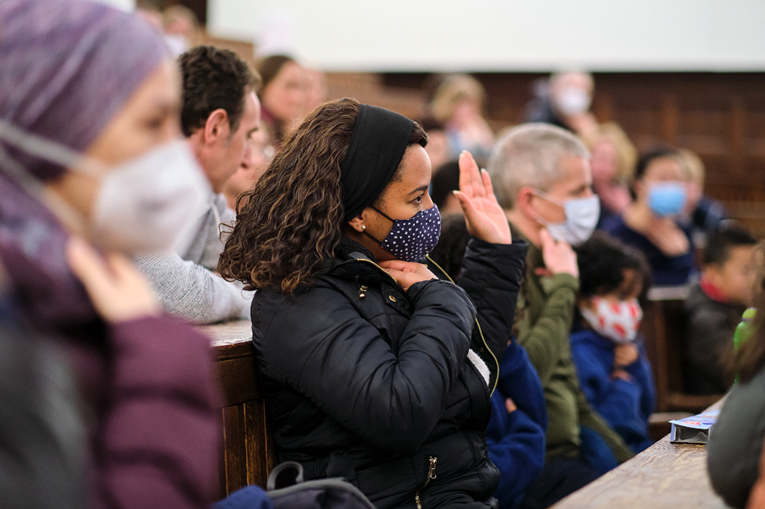
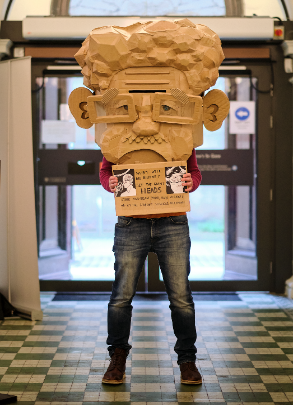
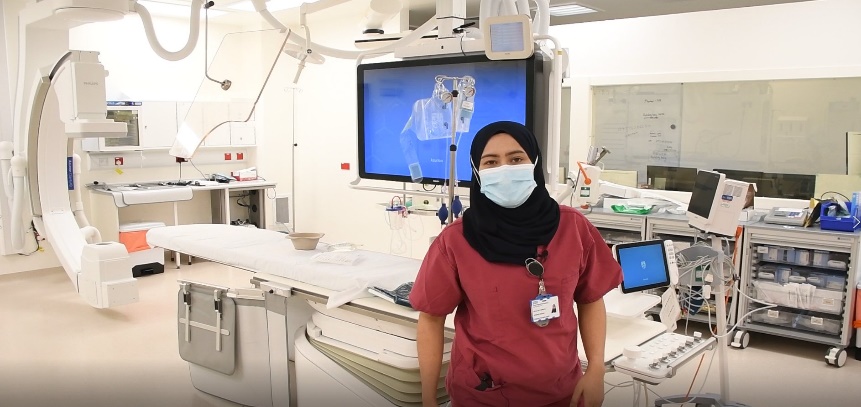
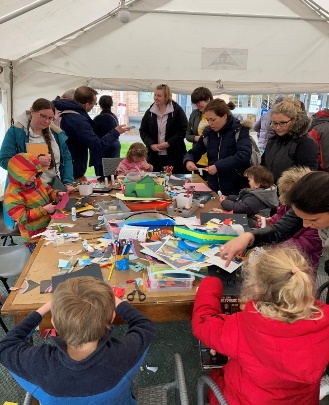
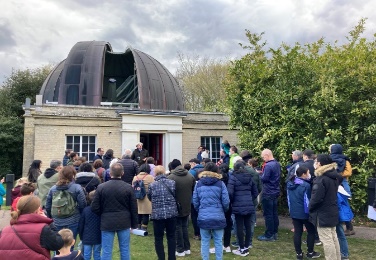
Figure 4. Image highlights from the 2022 Cambridge Festival.
Cambridge University Library collections represent an invaluable contribution to world heritage. Cambridge Digital Library opens up this knowledge to everyone for research, education or simple curiosity and wonder. In 2021-2022 1.3 million users accessed this unique resource.
Millennium Maths Project is a maths education initiative for ages 3-19 which focuses on increasing mathematical understanding, confidence and enjoyment. In 2021-2022 the MMP suite of programmes saw 6.3 million users worldwide, resulting in ~28 million page views.
Isaac Physics combines an online study tool with in-person and online events for physics, maths and chemistry. It offers support and problem solving activities for pupils and teachers to increase insight and understanding. In 2021-2022 Isaac physics had over 97,000 users, resulting in >20 million page views.
The pandemic has seen a growth of podcasts from across the University. The largest of these, Talking Politics, was downloaded 20 million times in 2020-2021.
The Centre for Science and Policy creates opportunities for public policy professionals and researchers to learn from each other through policy fellowships, workshops and professional development activities. Over 500 policy professionals from government, industry and third sector have worked with researchers to improve the use of evidence and expertise in public policy.
Cambridge Biomedical Resource Centre involves the public so that researchers understand patient priorities and research meets patient needs. Partnering with patient support groups, charities and community leaders, the BRC also works to increase involvement from underserved groups to ensure as many voices as possible are heard.
Cambridge Patient Led Research Hub supports patient-centred co-produced research with a focus on rare diseases working with patient groups to deliver clinical studies based on their own questions.
ThinkLab invites a team of researchers to critically tackle a live challenge posed by an external organisation or group. The model will be piloted as a community ThinkLab.
Aspect 4: Enhancing practice
Support
Evaluation training is a fundamental part of the support we offer. Researchers are introduced to a logic model approach to planning during our introduction to public engagement courses. This ensures researchers explore their own, and their publics’, aims for engagement.
Evaluation training is run throughout the year alongside masterclasses, including those using creative evaluation techniques. Individual mentoring and advice sessions use the logic model approach and evaluation tool kits including those developed with our museums for exhibitions and visits. This process guides researchers through planning and evaluation methodologies so they are relevant for their own projects.
Starter grant winners are required to undertake evaluation training as a condition of the grant. This ensures evaluation is embedded in their project and practice moving forward.
Inspiration, collaboration and accountability
We evaluate our training and programmes against our public engagement strategy using aims, intended outcomes and impact as outlined within our logic model.
Training courses are mapped to the Vitae Researcher Development Framework public engagement lens to ensure they are providing the skills researchers need for their professional development. Each course is evaluated by attendees and the overall programme is externally evaluated.
Across the University our activity is evaluated by publics, participants, researchers, contributors and by external evaluators. Our range of evaluation techniques includes creative and ethnographic methods. ‘Mystery shoppers’ provide insight through a customer service lens and a recent pilot with the UK Science Festival Network and Culture Counts has looked at how welcome people feel at events. Our museums and festivals use Audience Agency data to discover who comes to our events and who doesn’t. This supports event planning and our work to diversify our audiences and improve their experiences.
We share evaluation results internally and report on activity to UKRI, Research England and HESA through KEF, HEIF and HE-BCI returns, to the Office of Students, to funders and sponsors, and to the public.
Aspect 5: Building on success
Accountability and support
We regularly undertake NCCPE EDGE analysis of our work (Figure 5.) and, given the devolved nature of the University, have made substantial progress in many areas, particularly around embedding an internal culture supportive of public engagement.
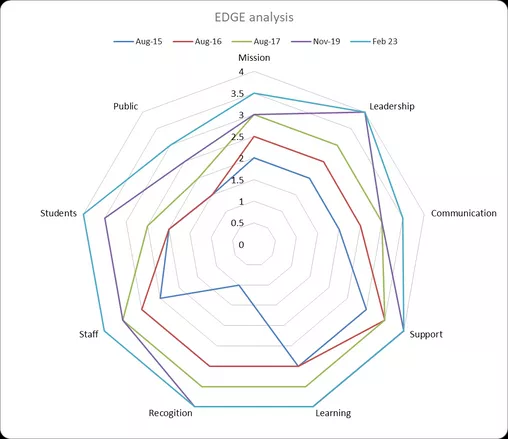
Figure 5. EDGE analysis of public engagement activity across the University of Cambridge.
Internal and external evaluation of our support programmes show that learning for researchers is real and significant. Interviews reported real shifts in researcher perception of their public engagement practice and that these shifts have been long lasting. Feedback has praised our public engagement training, not just for the practical skills researchers gain but also for showing them how engaged research practice opens up new opportunities.
“I believe this set of courses has really equipped me to continue with my public engagement journey in a more independent way, laying out the important points of developing a project, leading to more successful and professional engagement.”
Learning from evaluation informs our strategic approach, ensuring we continue to develop, adapt and improve our practice and support. Interviews with engaged researchers inspire others and help us develop our journey approach to researcher support.
Support, collaboration and inspiration
The past three years have proved challenging because of the Pandemic but, on the positive, our learning from online delivery has changed our engagement practice and allowed us to train, share and consult with professionals and publics across the world. It has also opened up our research to those previously excluded from traditional, in-person, events and festivals due to disability or because of caring and work responsibilities. As a consequence, hybrid delivery will continue to be part of our engagement practice in the future.
Collaboration
While on hold for much of the Pandemic, we have an ongoing focus on local community engagement. At the end of this reporting period we commissioned a community consultation. The results provide evidence on which further to develop and refine our community engagement strategy. New work streams focused on relational meetings and consultation will better support relationships locally and globally between experts by research and experts by lived experience.
Note You are currently viewing the latest version of this narrative statement. View the previous version as published in previous iterations of the KEF (KEF1 and KEF2)